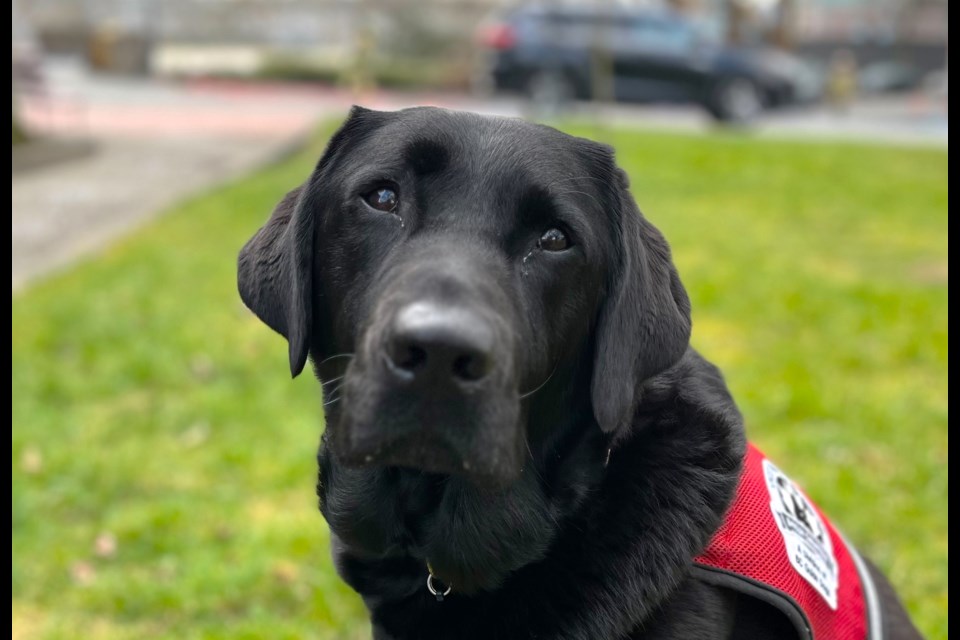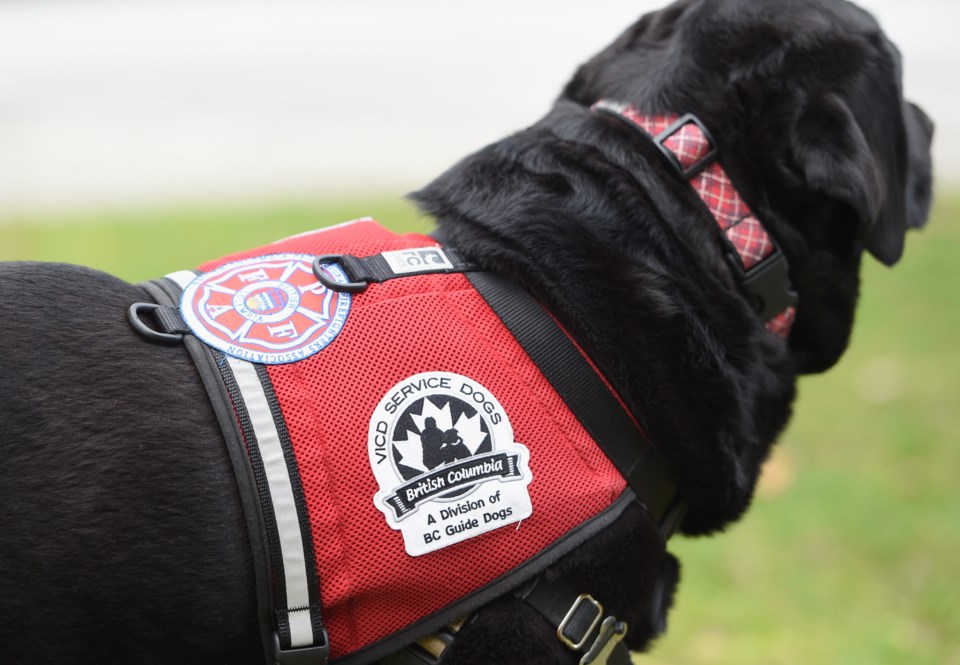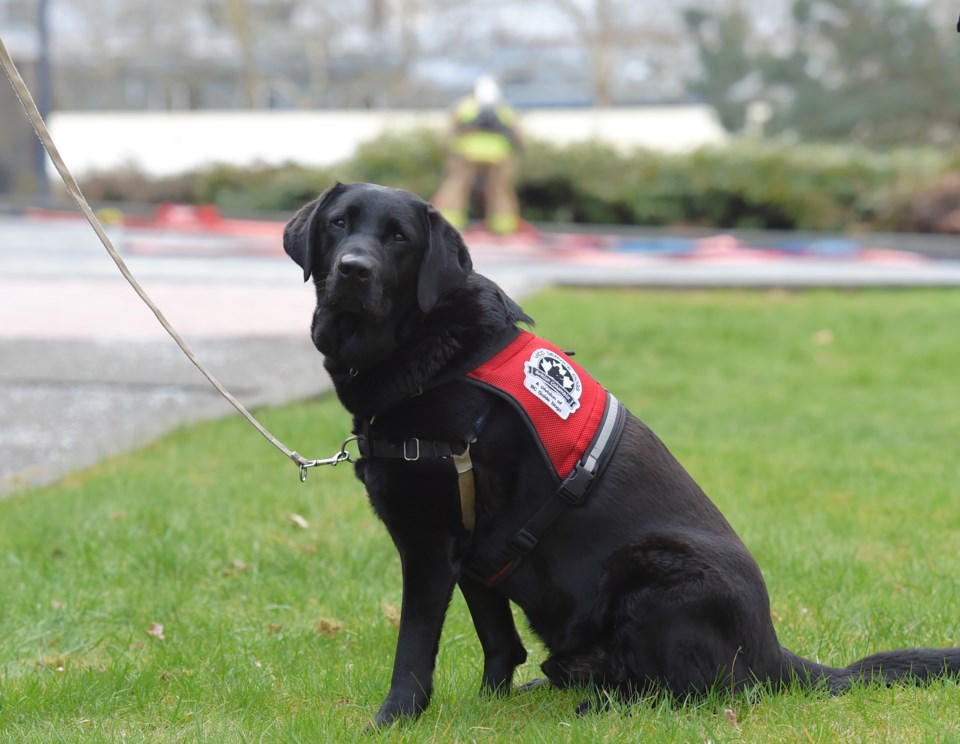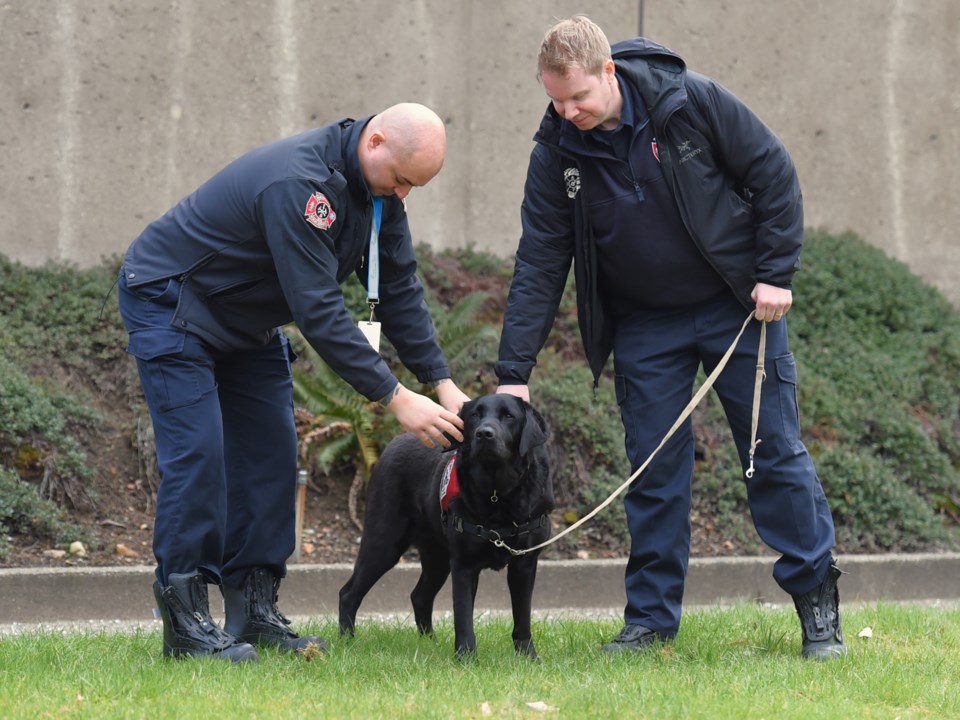Who do Vancouver's firefighters turn to when they need help?
Ferus, a six-year-old black lab, is always happy to lend a wet nose, friendly lick, or comforting companionship when someone with the (VFRS) .
As a trained occupational stress intervention dog, Ferus is an important part of the team making sure firefighters are taking care of their mental health.
A dog trained for a job
While most service animals are partnered with a specific person (often they work with children with autism or someone who is blind), Ferus is instead a part of the B.C. Professional Fire Fighters Association (BCPFFA), working out of the Vancouver fire department.
That's not to say the big black dog (he's 80 lbs.) is alone; his handler is Brandon Currie, a veteran firefighter and one of the mental health and wellness coordinators with the VFRS (along with Tim Scarr and Katrina Davison).
Ferus lives with Currie and his young family, spending his weekends hiking with them around the region. He even sleeps in Currie's son's room.
Ferus was trained through the BC and , in operational stress injuries (which includes post-traumatic stress) to work with veterans and first responders. He was purpose-bred for the work and trained for over 20 months.
"He's trained in firefighter stress intervention," says Currie. "And in doing so he is trained in down-regulating our members, so essentially taking someone from an elevated state of stress and bringing them down to a lower level."
While dogs are innately good at that, Currie adds, Ferus' natural talents have been honed so he can be intuitive and take the initiative.
"One thing with [Ferus] is that he's got the extra training to be alerted to stress responses and stress hormones," Currie says.
His training means he knows how to act, but it's the fact he's a big dog that is essential.
Currie explains that Ferus can help firefighters not stay stuck on traumatic events and images in their minds with the large dog physically on their person. "Instead you're now thinking of an 80 pound lab on top of you," describes Currie. "You really just transition back to the present moment."
What does he bring to the workplace?
Ferus relies both on taught skills and innate canine abilities to bring stress levels down in .
In a room full of firefighters having a meeting, he'll do his own thing and watch for signs of stress, which he's been taught to recognize.
He's not there to help one person all the time; he's there to help all the firefighters when they need it and will initiate an interaction.
For example, if Ferus sees someone bouncing a restless leg, he'll come over to rest his head on their thigh. Or he'll climb onto someone's lap to be close to them. If someone is holding their head in their hands he'll come over and give them some friendly licks to let them know he's there for them.
And if someone walks away in anger, he'll follow to make sure they're okay.
A dog's work day (and days off)
Ferus understands when he's on duty and off, Currie notes.
When they arrive at the hall for a work day, he's got a work attitude. If he's a bit too excited just before they go inside, Currie just tells him to focus and he does, bringing a calm, caring, approachable personality to work, perfect for people who need a comforting companion.
"It's a really cool event where I say 'are you ready to go to work?'" Currie says. "And you know, he's ready to come in and he wants to go and see everyone; he starts working the room and checks in on people."
His red vest is sort of like a uniform, but it doesn't just tell other people he's on duty. Ferus understands that when the vest is on, he's on.
"He's much more attuned to listening to me and watching what's going on when he has his vest on," Currie says.
When his red vest is off, Ferus gets to be a dog and play or relax as he wants.
If Currie has to work overnight as a firefighter, Ferus is on duty for part of the shift, but also gets the vest off and can sleep for hours at the hall.
And, like people, he has long days. Currie notices some nights Ferus is happy to get home and rest, like anyone else after a long shift.
Ferus also gets weekends when Currie does, as a member of the Currie family.
"We've got a rescue at the house. And so he's got a full family at home that he gets to kind of go and cut loose with," Currie says. "Then when he comes to work, he's ready to work."
When he's off at home or on weekends he gets to be a dog, but that doesn't mean he stops noticing who's stressed out. And that goes beyond just humans; if dogs are nervous he'll mirror them and make sure he's de-escalating the situation as best he can. If they want to play, that's good too.
He might not realize it yet, but he will get to retire one day, at about the age of 10. At that point, the team will factor in how Ferus seems to be enjoying his job.
They'll have to ask: "Does he want to retire? Does he still want to work?"
Currie notes he's spoken to other handlers about that time in a dog's work life, who say "dogs will kind of be like, 'I'm good, I'm good.'"
The work week for a working dog
Ferus' work days depends on Currie's and what's .
If there's been a and the Critical Incident Stress Management Team is called in to help VFRS members decompress, the dog is allowed to be loose to find those in need.
Ferus is part of that team, and that work is "the meat and potatoes of how we utilize Ferus," Currie says.
It's partly that Ferus is a helpful distraction.
"There's a dog in front of you, and you're not thinking about the terrible thing that you just witnessed," describes Currie of how Ferus impacts a distressed firefighter's mind.
As a mental health and wellness coordinator, Currie visits VFRS crews around the city, holding group sessions to make sure everyone is educated and up-to-date with ways to take care of themselves. While Currie is up at the front of the room, Ferus works the floor, wandering around and checking with people.
As a firefighter on active duty, Currie spends some of his time working at Vancouver's fire halls like every other firefighter. Ferus comes on those shifts, too, with the captain's approval.
Ferus can be somewhat independent on those shifts, visiting people throughout the building. When Currie is on call and Ferus is at the hall, other firefighters can still visit him and take him for walks.
"When he is on duty, I find that he just is just a part of the crew," Currie says.
Currie and Ferus also show up at a variety of events, especially those for firefighters and first responders. As he's owned by the BCPFFA, they'll also be called out of other parts of the province if the need is there.







